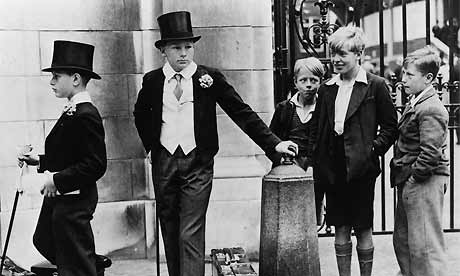Great
British Class Survey suggests traditional division is outdated. Now, we live
with seven social groups despite three
We have
always been told that there are three
different social classes: upper, middle and working-class. It has
been the model to understand society in modern ages. But now, BBC’s Great British Class Survey
states that British society (and we can assimilate it to all Western societies)
has seven social groups, different
from the traditional three.
 |
| Are we still living in a three class society? // The Guardian |
Sociologists
who elaborated this study pointed that nowadays we can’t split society only for revenues.
Social life and cultural capital also have to be taken into account. According to
sociologist Pierre Bourdieu, people whom know and what they do contribute to
your class and says at least as much as income does.
According
to this study, from now on we will be able to label ourselves with one of these seven tags:
- Elite. Same as former upper class, it’s the most privileged group and has the highest scoring economically, socially and culturally.
- Established middle class. It scores high in culture and sociability and it’s the second wealthiest group.
- Technical middle class. They have money but they have little social life. They also like emerging culture such as video games or indie music.
- New affluent workers. They usually are young people, with middle income but socially and culturally active. They usually own a house away from major cities.
- Traditional working class. It scores low economically, socially and culturally. They very often own a house and are the oldest group.
- Emergent service workers. They are the “live for today” people. It’s an educated young urban class without much money but very social and cultural.
- Precariat. Poorest class. They have the lowest score in economy, sociability and culture.
The lead
sociologist of the class survey Fiona Devine points that “there isn’t a clear hierarchy like in the past” between classes.
Nowadays, middle class groups are at
a similar level in society.
 |
| BBC explain these new social classes in its website, with data from more than 160,000 interviews. |
It’s quite important
that studies like this will be made. In the 21st century society is very different from the one after the Industrial Revolution. Today we
have the Internet and mobile phones and live in a very globalized capitalist economy. Our life
is different and we need new knowledge to understand
society, in order to find how does
it work and how can we progress.
If you
would like to know where are you with these new social classes, the BBC’s
website offers the opportunity to know where are you in the new
social groups.

Cap comentari:
Publica un comentari a l'entrada